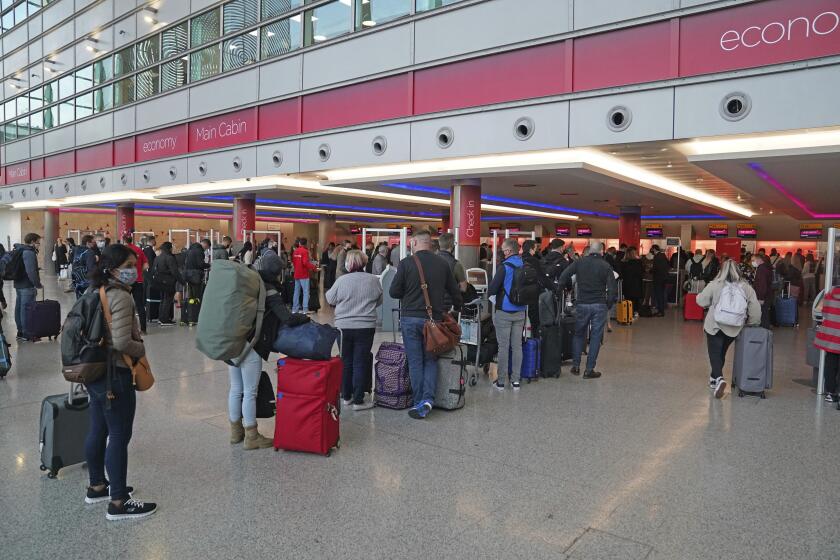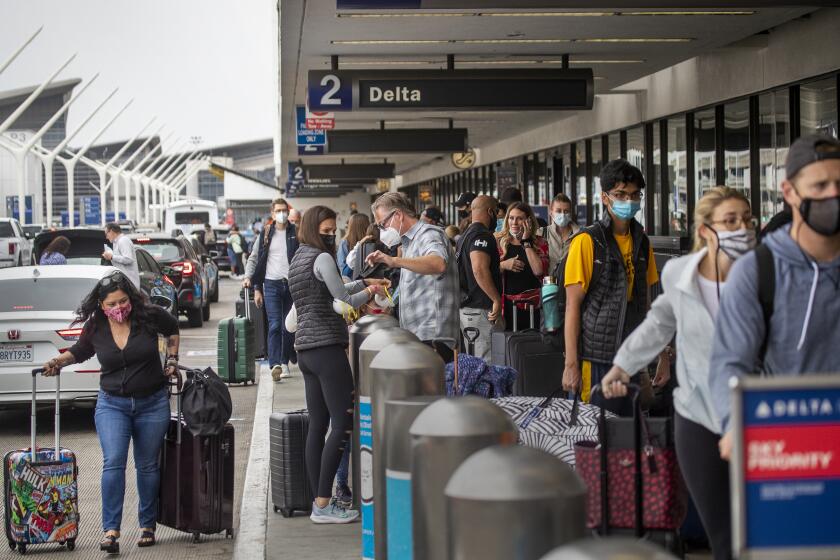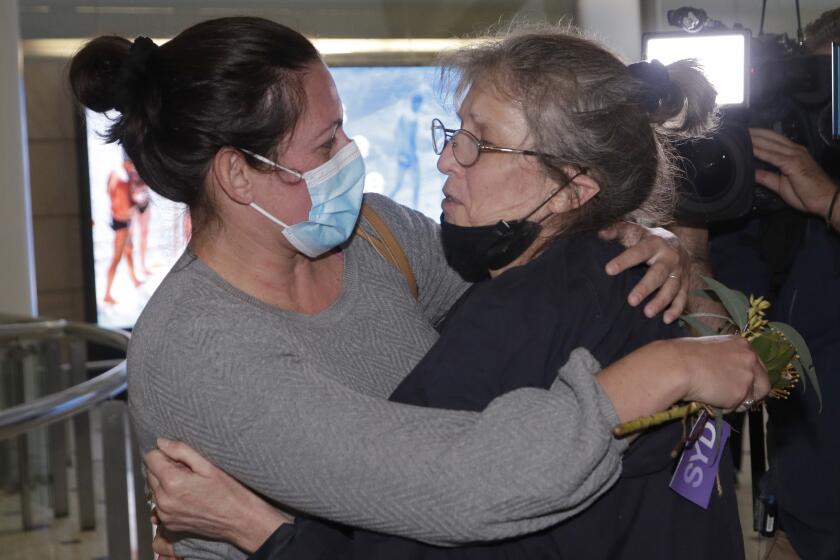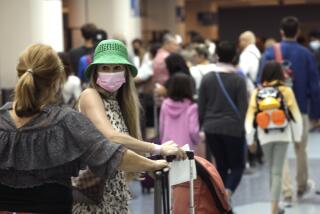New U.S. rules on international travel: Here’s what you need to know
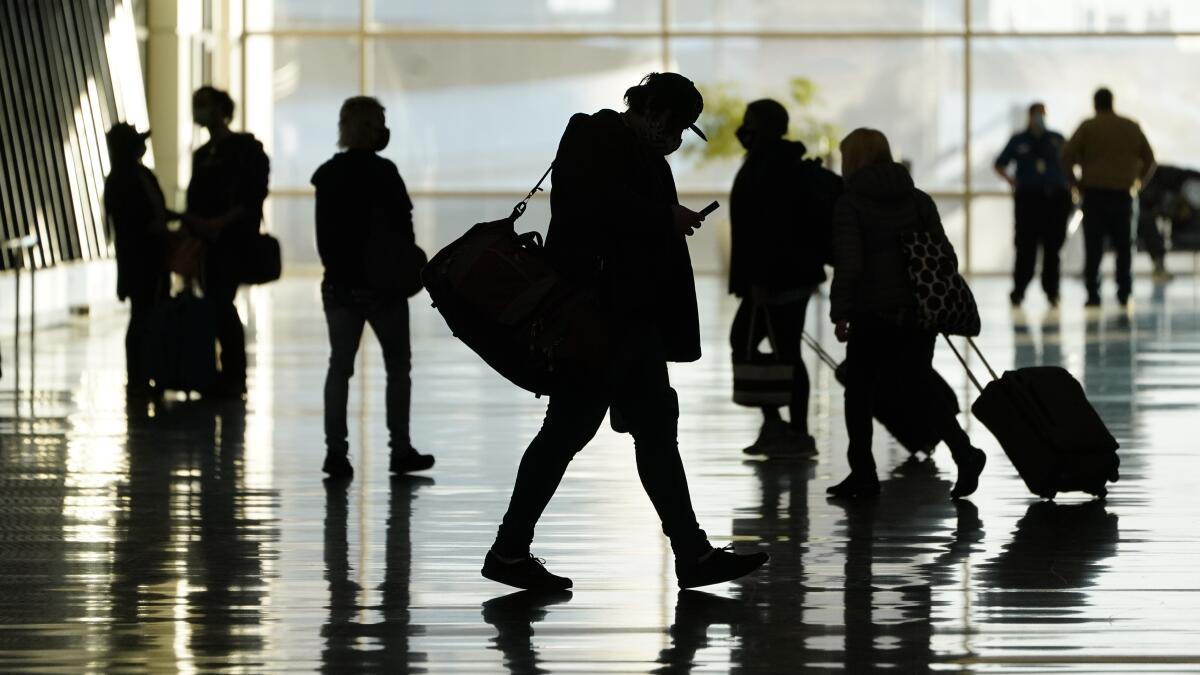
- Share via
More than a year and a half after COVID-19 concerns prompted the U.S. to close its borders to most international travelers, restrictions are shifting focus to vaccination status.
Beginning Monday, bans on travel from specific countries are over. The U.S. will allow in international travelers by land and air, but they must be vaccinated, with only a few exceptions.
Here are some questions and answers about the changes:
Why are these changes happening?
The goal is to restore more normal travel while limiting the spread of the coronavirus, the government says. The travel industry and European allies have pushed for an end to country-specific bans. Americans have been allowed to fly to Europe for months, and Europeans have been pushing the U.S. to change its policies.
In 2019, before the pandemic, about one-fifth of the roughly 79 million visitors to the U.S. came from Europe.
After a ban lasting more than 18 months, the U.S. is letting in visitors from a host of countries, including Mexico, Canada and most European nations.
What are the main requirements?
All adult foreign nationals traveling to the U.S. must be fully vaccinated before boarding their flight. As before, travelers will still have to show proof of a negative coronavirus test taken within 72 hours of departure to the U.S.
Does everyone need to be vaccinated?
Yes, with some exceptions. Children under 18 don’t need to be vaccinated, but they do need to take a coronavirus test. Kids who are 2 and younger are exempt from testing requirements.
What about adults who aren’t vaccinated?
Since half the world remains unvaccinated, and vaccine distribution has been so skewed to rich countries, the Biden administration is leaving a loophole for people who live in countries where vaccines are scarce. That list includes about 50 countries where fewer than 10% of people have been vaccinated. Travelers from those countries will need permission from the U.S. government to come, but it can’t be just for tourism or business travel.
The U.S. government says it will permit unvaccinated international visitors to enter the country if there is a humanitarian or emergency reason, such as an emergency medical evacuation. Those exceptions will be applied “extremely narrowly” and require approval from the Centers for Disease Control and Prevention. There could also be a medical exception, with documentation from a doctor.
Only 60% of TSA employees are vaccinated against COVID-19. It could mean trouble for Thanksgiving travelers.
What will U.S. citizens have to do?
Americans who are unvaccinated have to show proof of a negative coronavirus test within one day of international travel. If you’re vaccinated, you need to take a test within three days of your departure, for both Americans and citizens of other countries. This does not apply to flights within the U.S.
Who is going to enforce the vaccine rules?
That’s up to airlines. They will have to verify vaccine records and match them against ID, and if they don’t, they could face fines of up to nearly $35,000 per violation. Airlines will also collect information about passengers for contact-tracing efforts. There will be CDC workers spot-checking travelers for compliance in the U.S.
Which vaccines will let you in?
Most but not all of them. Any COVID-19 vaccines approved for emergency use by the World Health Organization, which include the Pfizer, Moderna and Johnson & Johnson vaccines used in the U.S. as well as most used overseas, such as AstraZeneca and China’s Sinovac, will be accepted. Not currently allowed are China’s CanSino shot and Russia’s Sputnik V vaccine, which is authorized in 70 countries. The WHO is reviewing Sputnik but hasn’t approved it.
Sydney’s international airport has come alive with tears, embraces and laughter as Australia’s border opened for the first time in 20 months.
What if you drive in from Mexico or Canada, or take a ferry?
The land borders had been open only for travel deemed essential. Now, anyone can come if you’re vaccinated against COVID-19. Be prepared to show proof of the shot to Customs and Border Protection agents. Children are exempt from the requirement.
How will this affect travel?
While the Biden administration is characterizing this as a reopening, some people who were technically allowed to fly to the U.S. earlier in the pandemic are now blocked because of their vaccination status. Other roadblocks to normal travel resuming are big delays in issuing U.S. visas, which people in most countries need to visit the U.S. for business and tourism, and restrictions in other countries that make travel difficult.
Even though many people coming from China will now be allowed into the U.S., for example, not many are expected to travel because of restrictions at home. Before the pandemic, Chinese tourists were a lucrative market for the U.S. travel industry.
Industry experts do expect a big increase in people flying from Europe and hope for a broader recovery in travel as more people get vaccinated globally, U.S. visa-processing speeds up, other countries lift their own restrictions and people feel less scared about getting COVID-19 through traveling.
More to Read
Sign up for Essential California
The most important California stories and recommendations in your inbox every morning.
You may occasionally receive promotional content from the Los Angeles Times.
